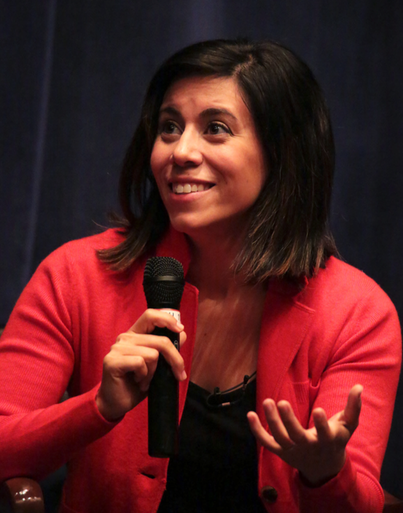
Ms. Henríquez speaks to the community at school meeting, giving students and faculty a more complex understanding of the assigned summer reading.
On Tuesday, September 19, Ms. Cristina Henríquez, author of this summer’s required school reading, The Book of Unknown Americans, visited the Choate community. While on campus, Ms. Henríquez had dinner with members of the English Department, spoke to Choate students in Advanced Creative Writing and Intensive Creative Writing courses, discussed her book at school meeting, and held a book signing. Ms. Henríquez’s book was chosen by a number of faculty members on the Summer Reading Committee, who wanted a text highlighted by awards that is appropriate for incoming freshmen and relevant to rising seniors. A more difficult piece of criteria for the required summer reading is the ability to bring the author to Choate to speak to the community. The Head of the English Department, Ms. Ellen Devine, said the summer reading must be “a piece of contemporary literature written by a living author, which is not often the kind of literature in traditional English classes.” This allows students to engage with the author’s writing process and mindset, rather than just seeing the novel in its final form.
Crossing this boundary between author and reader was explored during school meeting, when Ms. Henríquez described her uncertainty surrounding her book while it was in the works. Specifically, she spoke about how certain elements in the book weren’t added until much later in the process, and the order of the chapters were constantly switched around. This process was something Ms. Devine wanted Choate students to see. She said, “My hope is that students will have an opportunity to understand some of the things that happen when creating a text.”
Ms. Henríquez was also able to connect to Choate students by talking about her younger self. She said, “I was always walking around with my face in a book,” and one day she “had a revelation about how much I love, each day, writing.”
Ms. Henríquez also talked about the role of art in schools and how it frustrated her to think that schools take away arts requirements. She said, “The role of art is to impact some part of humanity into the world,” and she questioned what the objective of taking away art is. Furthermore, Ms. Henríquez described her thoughts on the political aspects of her book and in art; she believes that all art is political. “Saying that you’re going to ignore politics is saying that you’re going to ignore the world,” she said.
In addition to discussing her childhood and the value of art in society, Ms. Henríquez talked about the specific feelings she wanted to leave readers with in The Book of Unknown Americans. While Ms. Henríquez chose to incorporate the neighbors’ stories dispersed throughout the book, she created a closeness between the readers and the main characters of the novel. She expressed wanting the readers to care about the characters in her book so that by the end she could “break the readers’ hearts.”
Ms. Henríquez’s visit to Choate left students and faculty with a more complex and appreciative understanding of the reading, as they were able to view The Book of Unknown Americans as a work in progress as well as a finished product.
Zach Thomson ’18 said, “I really enjoyed her writing style because it connected with me.” He continued, “I think her coming and showing the process that she used in order to write the book was really helpful and insightful into how an author works.”
Alex Coletti ’20 said, “One question I had was why she decided to break it up into different perspectives, and that was clearly answered after she came, which I really enjoyed.”
Mia Katz ’21 commented, “I thought that her story seemed really powerful, especially considering the fact that she seemed to avoid any political interference within her storytelling. She just felt such a powerful need to touch on immigration and the unknown Americans of our world.”
Though reactions to Ms. Henríquez were quite positive, Ms. Devine explained that with the required summer reading, “There is no way to please everyone, but the point isn’t to please everyone.” Rather, the goal is to expose students to different thoughts, ideas, and perspectives and in turn, make them ask questions about the world around them.


